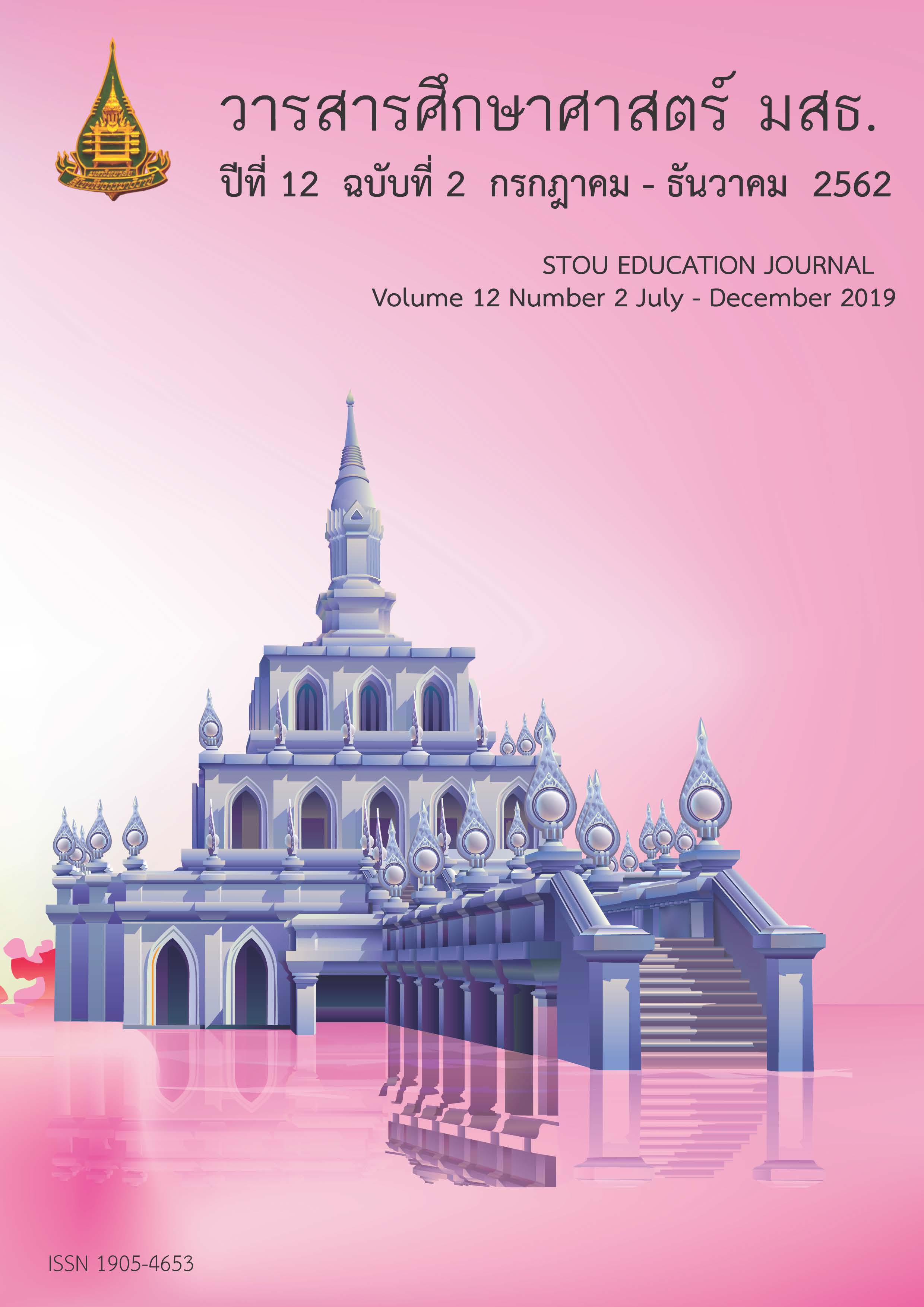การพัฒนารูปแบบการจัดกิจกรรมการเรียนรู้ 5 ขั้นตอน เพื่อเสริมสร้างคุณลักษณะจิตสาธารณะของนักศึกษาหลักสูตรครุศาสตรบัณฑิต มหาวิทยาลัยราชภัฏพระนคร
Main Article Content
บทคัดย่อ
การวิจัยครั้งนี้มีวัตถุประสงค์ เพื่อ 1) พัฒนารูปแบบการจัดกิจกรรมการเรียนรู้ 5 ขั้นตอน สำหรับนักศึกษา 2) เปรียบเทียบคุณลักษณะจิตสาธารณะก่อนและหลังการใช้รูปแบบการจัดกิจกรรมการเรียนรู้ 5 ขั้นตอน และ 3) ศึกษาความคงทนด้านคุณลักษณะจิตสาธารณะของนักศึกษา กลุ่มตัวอย่าง คือ นักศึกษาหลักสูตรครุศาสตรบัณฑิตชั้นปีที่ 3 มหาวิทยาลัยราชภัฏพระนคร ภาคการศึกษาที่ 1 ปีการศึกษา 2561 จำนวน 30 คน ได้มาโดยการสุ่มแบบกลุ่ม เครื่องมือที่ใช้ในการวิจัย ได้แก่ 1) รูปแบบการจัดกิจกรรมการเรียนรู้ 5 ขั้นตอน 2) แผนการจัดกิจกรรมการเรียนรู้ และ 3) แบบประเมินคุณลักษณะจิตสาธารณะ มีค่าความเชื่อมั่น .83 สถิติที่ใช้ในการวิเคราะห์ข้อมูล ได้แก่ ค่าเฉลี่ย ส่วนเบี่ยงเบนมาตรฐาน การทดสอบค่าที และการวิเคราะห์เนื้อหา ผลการวิจัย พบว่า 1) รูปแบบการจัดกิจกรรมการเรียนรู้ 5 ขั้นตอน ประกอบด้วย 4 องค์ประกอบได้แก่ (1) หลักการของรูปแบบการจัดกิจกรรมการเรียนรู้ 5 ขั้นตอน (2) จุดมุ่งหมายของรูปแบบการจัดกิจกรรมการเรียนรู้ 5 ขั้นตอน (3) กระบวนการจัดกิจกรรมการเรียนรู้ 5 ขั้นตอน คือ ขั้นสัมผัสความรู้สึก ขั้นขยายการรับรู้ด้วยสื่อต่าง ๆ ขั้นแบ่งปันประสบการณ์ ขั้นทบทวนตรวจสอบตน และขั้นประยุกต์ใช้ในชีวิตประจำวัน และ (4) การประเมินผล 2) คุณลักษณะจิตสาธารณะของนักศึกษา หลังการใช้รูปแบบการจัดกิจกรรมการเรียนรู้ 5 ขั้นตอน สูงกว่าก่อนการใช้รูปแบบ อย่างมีนัยสำคัญทางสถิติที่ระดับ .05 และ 3) คุณลักษณะด้านจิตสาธารณะของนักศึกษาไม่มีความคงทนหลังการใช้รูปแบบ
Article Details
เอกสารอ้างอิง
เกรียงศักดิ์ เจริญวงศ์ศักดิ์. (2543). โรงเรียนสร้างคนมีจิตสาธารณะ. วารสารการศึกษา 2000, 65(3), 17.
เดิมแท้ ชาวหินฟ้า, รัศมี กฤษณมิษ และสุวิตา แสงสีหนาท. (2550). รายงานการศึกษา แนวทางการปลูกจิตสำนึกคุณธรรมผ่านระบบการศึกษา: กรณีศึกษามูลนิธิพุทธฉือจี้ไต้หวัน. กรุงเทพฯ: พริกหวานกราฟิก จำกัด.
ปัณพร ศรีปลั่ง. (2559). การพัฒนากิจกรรมเพื่อส่งเสริมจิตสาธารณะ สำหรับนักศึกษาครูครุศาสตร์ มหาวิทยาลัยราชภัฏมหาสารคาม. (วิทยานิพนธ์ปรัชญาดุษฎีบัณฑิต ไม่ได้ตีพิมพ์). มหาวิทยาลัยบูรพา, ชลบุรี.
พรทิพย์ มนตรีวงศ์. (2554). การพัฒนาจิตสาธารณะในนักเรียนชั้นมัธยมศึกษาปีที่ 1 ด้วยการให้การปรึกษากลุ่มแบบพิจารณาเหตุผล อารมณ์และพฤติกรรม. (วิทยานิพนธ์วิทยาศาสตรมหาบัณฑิต ไม่ได้ตีพิมพ์). มหาวิทยาลัยบูรพา, ชลบุรี.
พระพรหมคุณาภรณ์ (ป.อ.ปยุตฺโต). (2558). โลกขึ้นสหัสวรรษใหม่คนต้องเปลี่ยนแนวคิดใหม่ (พิมพ์ครั้งที่ 2). กรุงเทพมหานคร: โรงพิมพ์สหธรรมมิก จำกัด.
ไพบูลย์ วัฒนศิริธรรม และสังคม สัญจร. (2543). สำนึกไทยที่พึงปรารถนา. กรุงเทพมหานคร: มูลนิธิบูรณะชนบทแห่งประเทศไทยในพระบรมราชูปถัมภ์.
วสิษฐ เดชกุญชร. (2560). จิตอาสา: โครงการพระราชทานในรัชกาลที่ 10. สืบค้นจาก www.matichon.co.th.
วิเชียร อิทรสมพันธ์ กฤษดา ผ่องพิทยา และวิกรม สุขธรณี. (2560). การพัฒนาจิตสาธารณะของนักศึกษามหาวิทยาลัยราชภัฏบ้านสมเด็จเจ้าพระยาด้วยรูปแบบการสอนตามแนวคิดจิตวิทยาร่วมสมัย. วารสารศึกษาศาสตร์ มสธ., 10(2), 109-120.
วัลลยา ธรรมอภิบาล. (2555). การพัฒนาหลักสูตรเสริมสร้างจิตสาธารณะสำหรับนิสิตระดับปริญญาตรี มหาวิทยาลัยทักษิณ วิทยาเขตสงขลา. (วิทยานิพนธ์การศึกษาดุษฎีบัณฑิต ไม่ได้ตีพิมพ์). มหาวิทยาลัยศรีนครินทรวิโรฒ, กรุงเทพมหานคร.
สมปอง ช่วยพรม. (2559). การพัฒนารูปแบบกิจกรรมเสริมสร้างจิตสาธารณะตามหลักการเรียนรู้แบบรับใช้สังคม สำหรับนักเรียนระดับประถมศึกษา. (วิทยานิพนธ์การศึกษาดุษฎีบัณฑิต ไม่ได้ตีพิมพ์). มหาวิทยาลัยนเรศวร, พิษณุโลก.
Bandura, A. (1977). Social learning theory. New Jersey: Prentice-Hall.
Joyce, B. and Weil, M. (2004). Model of teaching (7thed.). Boston: Allyn and Bacon.
Kohlberg, L. (1976). Moral stages and moralization moral development and behavior: Theory, research and social Issues. New York: Holt, Rinehart and Winston.
Kolb, D.A. and Fry, R. (1975). Toward and applied theory of experiential learning. In C. Cooper (ed.). Theories of Group Process. London: John Wiley.
Krathwohl, D. R., Bloom, B. S., and Masia, B. B. (1964). Taxonomy of educational objectives Handbook II The affective domain. New York: McKay.
Kriengsak Chareonwongsak. (2018). เล็กพริกขี้หนู สืบค้นจาก http://www. Kriengsak.com.


